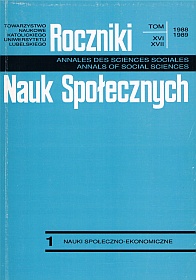Dialogue in the Social Teaching of the Church
Abstract
Dialogue has been much talked about recently, though it is not always understood properly. That is why the author wanted to present the standpoint as it is presented in the social teaching of the Church.
First, social-cultural conditions of dialogue has been pinpointed. The author finds them in the processes of secularization and pluralism which processes have led to the disintegration of traditional society, and in consequence to the development of other alternatives, options and choices. In the conditions of secularization and pluralism, both the Church and society /state/ has been, as it were, "forced" to enter into dialogue.
Then the author concentrated of the evolution of the social teaching of the Church concerning dialoque. On the one hand, it consists in accepting tolerance at the personal level, and on the other hand, on a solidary cooperation at the social /national and all-human/ level. Both those levels are crucial for the development of man and mankind, nevertheless in the social teaching of the Church more attention has been paid to tolerance than to solidarity.
Then the author discussed the conditions and types of dialogue. Certainly dialogue, despite various aspects, embraces three elements: subject, object and goal. The subject of a dialogue can be all equal partners. The object of a dialogue can be truths or values. The first case concerns a dialogue connected with people’s outlook on life, and the second a dialogue aiming at activity. The aim of a dialogue in common good of society which good is an aim of the state. This kind of a dialogue should be based on an agreement of basic social values. The conditions of a dialogue may work differently, depending on the conditions of place and time.
Finally, the author emphasized that in the society of real socialism there is no room for dialogue without pluralism, without seeking consensus as to the fundamental values, and without cooperation of all social forces for the benefit of common good, properly understood by those who stand high in society and those who stand low.
Copyright (c) 1989 Roczniki Nauk Społecznych

This work is licensed under a Creative Commons Attribution-NonCommercial-NoDerivatives 4.0 International License.


